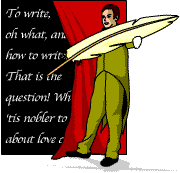Where do you keep your notes?
Created | Updated Dec 2, 2012
Words, words, words. That's what we're made of. Herewith some of my thoughts on what we're doing with them.
Writing Right with Dmitri: Where Do You Keep Your Notes?

Aha, you say. That's a no-brainer. I have a Blackberry. Or a Raspberry Pi. Or some other fruit-flavoured hand-held device.
The other day, Minorvogonpoet asked me, 'Have you told them about the importance of keeping a notebook handy?' She and Cactuscafé are great notebook-keepers.
No, I said. Because my memory is a lot more reliable than my handwriting. I'm not kidding – even I can't read my handwriting, which gets worse every day. Not for me the notebook by the side of the bed, midnight dream inspiration, for the recording of. Nor for me the handy notepad to whip out on a walk, in order to jot down the eureka moment. Nope. It's in my head, or it's not there. So how do I find it again?
I use the Poe method.
The room in which I found myself was very large and lofty. The windows were long, narrow, and pointed, and at so vast a distance from the black oaken floor as to be altogether inaccessible from within. Feeble gleams of encrimsoned light made their way through the trellised panes, and served to render sufficiently distinct the more prominent objects around; the eye, however, struggled in vain to reach the remoter angles of the chamber, or the recesses of the vaulted and fretted ceiling. Dark draperies hung upon the walls. The general furniture was profuse, comfortless, antique, and tattered. Many books and musical instruments lay scattered about, but failed to give any vitality to the scene. – Edgar Allan Poe, The Fall of the House of Usher.
A long-ago critic once noted that Roderick Usher's house mirrored his mental state. His mind, like his room, was Gothic and full of dusty and weird furniture. Which is a very good observation. Okay, maybe all my mental houses aren't quite that Gothic. I've got some in there that are rather sunny and modern. Some spaces, like the starship, are more outré than anything Poe thought up. But you get the idea.
The most recent version of Sherlock Holmes, in the US, at any rate, is the one by Jonny Lee Miller. Miller's Holmes says the same thing to Lucy Liu, his Watson: he keeps his mental map in the form of architecture. I really liked that, because that's just what I do. If I learn something new, I build a new room. So how does it work?
Some things we learn are stored in tactile memories, like the exact sequence of keys to play a song or type in a password. If you don't believe me, notice how your fingers betray you when you change one. Some memories, as Proust famously pointed out, are subject to olfactory retrieval. (Can you say 'madeleine'? I knew you could.) Me, most of my memories are linked spatially, or more properly, temporospatially: for instance, a change in weather will trigger a memory, or walking around the room, or remembering a street.
If I want to recall something, I let my mind go to the place that's become connected to it, and the associations emerge. It needn't be where I first had the idea: it could just be an idiosyncratic set of associations. For example: This month, Paulh has been telling us an ongoing story as part of NaJoPoMo. For some reason, his first installment got stuck in my head as taking place in the apartment my family lived in during 1963/64, in the suburbs of Chicago. Why, I'm not sure, but Paulh's story is now filed in my mental storage disk next to the works of Richard Matheson.
It's a fun form of information retrieval, as well, because you can stop and smell the coffee and baked goods as you go. Every time somebody needs information about Greece, I can recall fun times I had in that country, meals I enjoyed, the feel of the sun on my face at the beach near Abdera. . .
I suppose an orderly person keeps their mental map with labelled shelves. They might have drawers they can pull out. Notes left on a bulletin board. Me, I've got the Akashic Library – a sort of hyperlinked landscape in which there are many streets, gardens, houses, all connected to information I want. Or might want. Or stuff that's just too good to throw away. I can always find things. All I have to do is imagine, free associate, and look around. Sooner or later, I'll stumble upon it. Or it will come up and bite me for attention.
Okay, keep your notebooks. I'll go wander around my head. Coffee, anyone? I'll meet you at the corner.
Writing Right with Dmitri Archive
